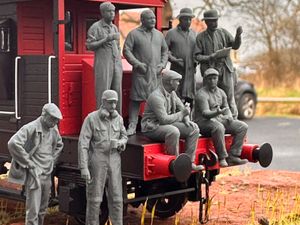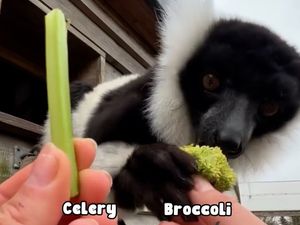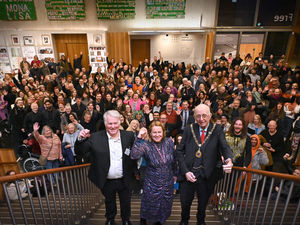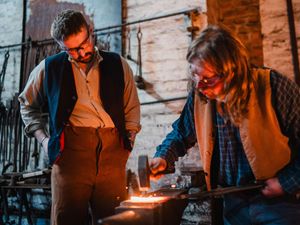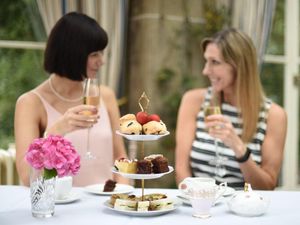Real privilege to be at Dudmaston: What it's like to...Be a conservation assistant
From protecting precious art to releasing grass snakes back into the wild - there is a never a dull moment at work for Lucy Cooper.
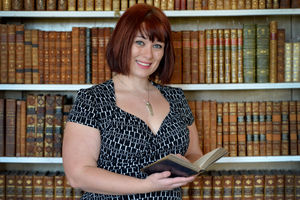
Every day she relishes the chance to immerse herself in more than 875 years of history at one of the region's grandest homes
As a National Trust conservation assistant, it's her job to look after the remarkable collections at Dudmaston Hall in the village of Quatt near Bridgnorth.
First bequeathed to the National Trust in 1976 by Lady Rachel Labouchere, the estate now welcomes thousands upon thousands of people every year.
As well as housing one of the most important private collections of modern artwork in Britain, it is also the much-loved home of Mark and Elfrida Hamilton-Russell and their two children Oscar and Rachel.
And it's this family connection that makes Dudmaston such a special place to visit and work, according to 26-year-old Lucy.
"It's one of the few National Trust properties that is still lived in. A lot of houses are frozen in time but there are people still living here. It's living, breathing history.
"There are family photographs and treasured items. You are not just a custodian of history here, you are living amongst it and it's always evolving," she says.
Lucy, who has degree in ancient history from the University of Birmingham, has worked at Dudmaston for four years.
Every day starts with inspecting the house and galleries as well as the collections for any signs of deterioration and then cleaning gets under way.
"The National Trust is all about preventive conservation, we want to stop an object deteriorating to the point where it needs to be restored," says Lucy.
This means that light levels, humidity, pests and temperature are among the 'agents of deterioration' that are constantly monitored to ensure items aren't being damaged.
It might mean adjusting the blinds to control the amount of light in a room depending on the brightness of the sun or putting out traps for wood-boring insects which could eat or damage items in the collection.
At the moment a new heating system is being installed at the property to help prevent problems such as mould, corrosion, cracking or distortion.
It will warm the building to ensure the collections have a constant relative humidity – between 50 and 65 per cent.
Lucy says it's about striking a balance and finding a humidity and temperature that is suitable for both the house and collection as well as all the people within it.
"The heating system will have sensors in each room so we can keep an eye on the humidity levels. Changing from low to high relative humidity can cause paintings to flake and wood to crack and distort.
"Being able to raise the temperature will decrease relative humidity and establish a safe level for our collections," she explains.
Cleaning its a vital part of conservation and staying on top of dust is important to prevent any damage.
"Dust is a big issue for us especially with thousands of visitors coming through the house every year.
"When people think of conservation, they may think of restoration but a lot of time it's me and a Henry vacuum cleaner, duster and brushes,"she says.
Bigger items such as the vast book collection in the library also receive a 'deep clean' throughout the year. And this has led to some unexpected treasures being discovered.
In 2015, volunteer Elizabeth Dewer found a letter glued into a book about Lord Nelson who died during his victory at the Battle of Trafalgar in 1805 which appeared to have been written by the famous Admiral himself.
"It was just found by chance while cleaning and we had it verified that it was written by Lord Nelson. It's amazing that it was just tucked away in a book waiting to be found. We've also got first editions by the Bronte sisters written under their male pen names. It's fascinating," says Lucy.
She says the library which is at the back of the property and offers striking views of the Big Pool is her favourite room in the house.
"The views from this room are truly stunning and when the sun starts to set, it makes the room the glow, it really looks golden," Lucy tells us.
Her favourite items in the collection include a bronze sculpture by Kenneth Armitage titled Standing Woman by Kenneth Armitage. "Some times the woman looks strong and together, other times sad. Some days I look at her and think i feel like that," she explains.
Sometimes the job surprises her especially when the local wildlife pays a visit. "We often find birds and snakes in the house when we open up.
"We've had tiny newts too. The snakes tend to come in after it's rained a lot and then we release them in the park. There can't be many jobs where it's considered normal to be releasing a snake back into the wild," says Lucy.
She is also the estates volunteer champion and looks after the small army of 300 helpers who lend a hand in the garden and inside the hall.
"I spend a lot of time with the volunteers, they are the foot soldiers of the National Trust, we wouldn't exist without their help. They have a rich tapestry of life and their experience and input is invaluable," Lucy tells Weekend.
As part of her role she also works out nearby Morville Hall, which opens to the public on eight days during the year and is home to Chris and Sarah Hodsoll.
"You go down the drive and you go back in time. There are also eight individual tenants living there and there is a real community feel that you don't feel anywhere else these days.
"The hall feels like you could move in now. It's grand but on a cosy scale - it's delightful," says Lucy who studied for a master's degree in heritage management at the University of Birmingham linked with the Ironbridge Institute for Cultural Heritage.
Lucy will soon be leaving to take up a more senior position as house steward at another National Trust site, Stourhead, a Palladian house in Wiltshire, but she says Dudmaston will always have a piece of her heart.
"Every day I've had to pinch myself because I feel so lucky to be working here. It's been a real privilege," she says.

